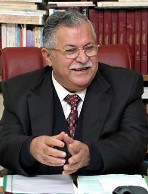By Mariam Karouny BAGHDAD (Reuters) - Iraq's parliament elected Kurdish leader Jalal Talabani as the country's new president on Wednesday, breaking a political impasse and paving the way for a new government more than nine weeks after historic elections.
He is the first Kurd to be Iraq's president, underlining the new clout of the minority that backed the U.S.-led invasion in 2003.
The two vice presidents were named as Adel Abdul Mahdi, a Shi'ite who was finance minister in the outgoing government, and Sunni Arab tribal leader Ghazi Yawar, the previous president.  The Islamist-led Shi'ite alliance that won a slim majority in parliament and the Kurdish coalition that came second in the polls have been arguing for weeks about forming a government.
The Islamist-led Shi'ite alliance that won a slim majority in parliament and the Kurdish coalition that came second in the polls have been arguing for weeks about forming a government.
They have also been trying to include representatives of the Sunni Arab minority that dominated Iraq under Saddam Hussein but was left sidelined after most Sunni Arabs stayed away from the January polls due to intimidation and calls for a boycott. There are only 17 Sunni Arab lawmakers in the 275-member parliament.
Disagreement over which Sunni Arab would be vice president held up a deal, but political leaders decided late on Tuesday to favor Yawar over elder statesman Adnan Pachachi.
Once the president and his deputies have been appointed they must name a prime minister within two weeks. Shi'ites and Kurds have agreed that Islamist Shi'ite leader Ibrahim Jaafari should be prime minister, taking over from secular Shi'ite Iyad Allawi.
Jaafari is expected to be officially appointed on Thursday, and will then name a cabinet. Disagreement remains on some cabinet posts, particularly the oil ministry which is coveted by both the Shi'ites and the Kurds.
INSURGENT ATTACKS
Many Iraqis have complained that politicians have let them down by taking so long to form a government. Several Iraqi officials say the delay has benefited Iraq's insurgents.
A U.S. soldier was killed in Baghdad when guerrillas ambushed a patrol with a roadside bomb and then opened fire, the American military said. On Tuesday, the military announced that four U.S. soldiers had been killed in attacks in Iraq.
Since the invasion in March 2003, at least 1,540 U.S. military and Pentagon personnel have lost their lives in Iraq.
U.S. officers say the frequency of insurgent attacks is falling. But in recent weeks guerrillas have fought several large-scale battles with U.S. forces -- an unusual development as insurgents generally favor hit-and-run attacks.
On Monday, dozens of insurgents fought U.S. and Iraqi forces in a remote area east of Baghdad. Two Americans and one Iraqi soldier were killed, the U.S. military said.
On Saturday, more than 40 U.S. soldiers and 12 prisoners were wounded when insurgents attacked Abu Ghraib jail west of Baghdad with suicide bombs, mortars and small-arms fire. The battle raged for around an hour.
Last month scores of guerrillas attacked a U.S. convoy near Salman Pak southeast of Baghdad. The U.S. military said it repelled the attack and killed at least two dozen insurgents.
http://www.reuters.com/newsArticle.jhtml?type=topNews&storyID=8099036


